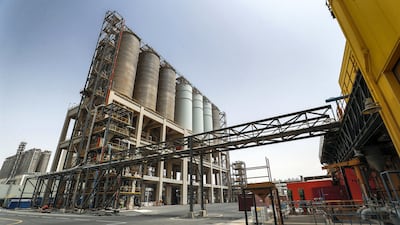Abu Dhabi National Oil Company and Austrian chemicals producer Borealis have signed a $6.2 billion partnership agreement for the development of the fourth unit of a polyolefin manufacturing complex in the UAE's downstream hub of Ruwais.
Sheikh Khaled bin Mohamed bin Zayed, a member of the Abu Dhabi Executive Council, and chairman of the Abu Dhabi Executive Office and the executive committee of the board of directors of Adnoc, witnessed the signing of the agreement.
“Adnoc and Borealis’ significant investment in the fourth expansion of Borouge ensures the long-term and sustainable supply of core materials to critical sectors vital to both the UAE and global economy,” said Dr Sultan Al Jaber, Minister of Industry and Advanced Technology and Adnot
“This expansion will see Borouge become the world’s largest single-site polyolefin complex, as it continues to play an integral role in the development of Ta’ziz, enhancing local industrial supply chains and boosting in-country value opportunities,” he added.
Last year, Adnoc and industrial holding company ADQ announced plans to work on projects worth $5bn within the Ruwais Derivatives Park.
The joint venture, Ta'ziz, will look to invest in chemical projects worth $3bn, with $2bn expected to be spent on the development of port and infrastructure facilities in Ruwais.












Borouge, a joint venture between Adnoc and Austria's Borealis, is going through a large capacity addition as part of plans unveiled in 2018 by the national oil company to invest $45bn with partners in the downstream sector.
The Emirates plans to triple its petrochemical production capacity from 4.5 million tonnes — currently produced entirely by the Borouge facility in Ruwais — by 2025.
The feedstock for the planned expansion will be supplied by Adnoc.
The new facility will see Borouge produce polyolefin products such as polyethylene and polypropylene, as well as non-polyolefin products such as benzene and butadiene. The compounds find varied uses in packaging, plastics and acrylics industries.
With the addition of the new unit, Borouge could produce enough polyolefins to meet the manufacture of pipes to supply water to 35 million households, the company said. The new products will feed into a wide range of uses including industrial-grade pipes, cables, films and personal protective equipment.
“Borouge is the key vehicle that enables us to serve the growing customer needs across the Middle East and Asian markets with future-orientated and differentiated solutions based on Borstar, Borealis’ proprietary state-of-the-art technology,” said Thomas Gangl, chief executive at Borealis.
The company also plans to install a carbon capture unit to offset emissions by 80 per cent. The unit will be operational in time for the start-up of Borouge 4.
Borouge operates a 450,000 tonnes per annum polythene unit, which was commissioned in 2001. Borouge 2 and 3, commissioned in 2010 and 2014, raised the capacity to 2 million tonnes and 4.5 million tonnes of polyethylene and polypropylene per annum, respectively.
With the final unit, overall polyolefin production will reach 6.4 million tonnes, making Borouge 4 the largest-single site facility for polyolefins.
The increased output will capture the growing demand for polyolefins in the Middle East, Arica, and Asia.
Borealis, the Austrian company which is a joint shareholder with Adnoc, is the eighth-largest producer of polyethylene and polypropylene and has oil and gas company OMV as a significant minority shareholder.
Adipec 2021 day one - in pictures




















